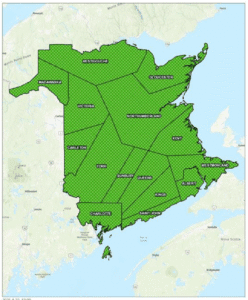More cases prompt declaration, vaccine clinics
Two additional cases have been confirmed since Thursday, bringing the total number of confirmed cases in the province since Oct. 24 to five. Other potential cases are under investigation.
Two people are hospitalized at the Dr. Everett Chalmers Regional Hospital. Precautions have been taken, and there is no known risk of exposure to the public.
“The situation is evolving rapidly,” said Dr. Mark McKelvie, regional medical officer of health. “Measles is highly contagious. It can be severe in adults and infants, and can cause serious complications. With the number of cases growing – and expected to continue growing – now is the time to get vaccinated if you are not protected through previous exposure or vaccine.”
McKelvie said the risk remains low for people who are protected.
Public Health reminds residents of the upper Saint John River Valley that Horizon Health Network will host vaccine clinics at the Western Valley Multiplex in the Centreville district of Carleton North on Saturday, Nov 2, from 9:30 a.m. to 5:15 p.m., on Monday, Nov. 4, from 12:30 p.m. to 3 p.m., and on Wednesday, Nov. 6 from 9:30 a.m. to 12:30 p.m.
People are encouraged to book an appointment through the provincial scheduler or by calling Tele-Services at 1-833-437-1424 (available Monday to Friday, 8:15 a.m. to 4:30 p.m.).
Most people born in 1970 or later can be protected from measles infection with two vaccine doses. McKelvie said the measles vaccine has been used for over 50 years and is safe and highly effective at preventing infections. Those who are unsure of their vaccination status or that of their children are urged to contact their healthcare provider or local Public Health office.
The vaccine that protects against measles, mumps, rubella and varicella (MMRV) is for babies aged 12 and 18 months. While those born before 1970 are generally considered to be protected from measles, people born later who have not received two doses of the measles, mumps and rubella (MMR) vaccine should get vaccinated.
“Public Health continues to monitor contacts and notify people of potential exposure as it becomes aware,” said McKelvie. “In the meantime, New Brunswickers can do their part to limit the spread of this outbreak by ensuring they are protected against measles.”
People experiencing symptoms consistent with measles should isolate and contact Tele-Care 811 by telephone and follow the operator’s instructions. They should not go to an emergency room, doctor’s office or clinic. Anyone who is seriously ill and needs to go to the emergency room should call ahead to reduce the risk of spreading the disease.
The measles virus is one of the most contagious infections known. It is transmitted through the air or by direct contact with the nasal or throat secretions of an infected person. Measles can be more severe in adults and infants and can lead to complications.
Symptoms of measles may include fever, cough, sore and/or red eyes, runny nose or tiny white spots in the mouth. Within three to seven days, a red blotchy rash will appear, first on the face and then spreading to the body, arms and legs.














